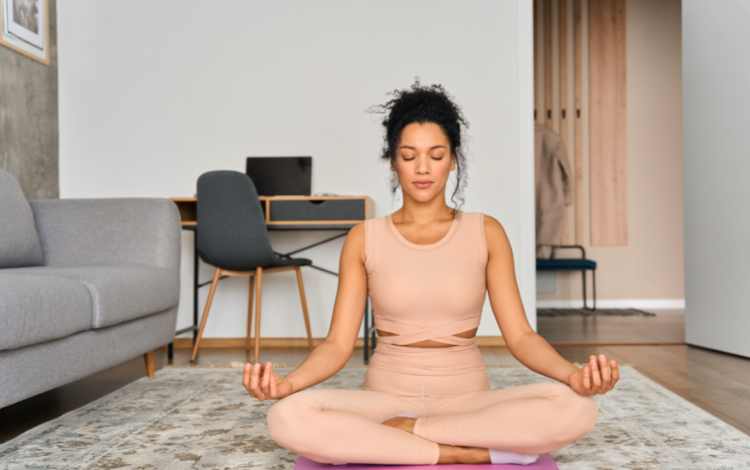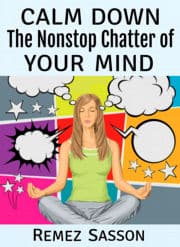
Here is an easy and simple guide on how to practice meditation at home. Learn about what it means to meditate at home, how to do it efficiently, and which benefits come as a result of your efforts.
Most people associate meditation with traditional monasteries and temples. For many, it can feel like an alien concept.
Fortunately, you don’t have to join a monastery or spend hours every day reading up on practices and traditions to start meditating at home. In fact, doing so is much easier than most people think.
Browse our online courses on meditation, positive thinking, overcoming procrastination, confidence, and freedom from distractions.
If you’re ready to start exploring the advantages that meditation can bring to your life, read on.
First, let’s talk about what meditation is.
What Is Meditation?
Meditation is the process of focusing your mind to unload it of extraneous thoughts and feelings.
You can meditate in solitude, with a partner, or with other like-minded individuals. You can make it a part of your way of life.
Meditation is an excellent way to improve mental health, gain clarity and focus, and connect with your higher self.
There are many forms of meditation, and the majority fall under one of two categories – concentrative or mindfulness.
Concentrative meditation is the act of pulling your focus toward one single focus point. This can be anything you want it to be. You might focus on your breathing, bodily sensations, a mantra, an inspiring quote, or a certain image.
You can also choose to focus on a specific sound, like a babbling brook or quiet music. You can even choose to focus on the feeling of your feet on the ground or the sensation of the air against your skin.
Mindfulness is the act of centering your mind on the present. When practicing mindful meditation, you are attending to your thoughts, feelings, and experiences with an open mind but not getting caught up in them.
When you practice mindful meditation, you are actively trying to control your thoughts, feelings and experiences to have a better and wider perspective of the world around you.
There is also a third form, and that is to empty your mind from thoughts and focus on the silence inside. However, this form of meditation is a more advanced form, suitable for more advanced meditators.
“Wisdom comes with the ability to be still. Just look and listen. No more is needed.”
– Eckhart Tolle
5 Benefits of Meditation
Here are a few of the benefits of meditation.
Healthy Mind
When you meditate, you are actively trying to quiet your mind. This helps you to become fully present and to experience the here and now.
This can be a very healing experience for both your body and your mind.
Regular meditation can help to relieve stress, anxiety and stress-induced health issues.
Improved Focus
Meditation can help you focus on your daily activities, on your work, goals, and what is important in your life.
A Calm Mind
Meditation can help to develop a calm and focused mind.
A calm mind can help you to gain greater control over your emotions, which can be a great source of strength and support when facing particularly challenging times.
Freedom from Stress
Meditation frees the mind from stress and anxiety and brings in a positive attitude, confidence and inner strength
Increased Confidence
People who regularly practice meditation have a significantly higher sense of self-confidence than those who did not meditate.
More on the benefits of meditation.
How to Do Meditation at Home
Let’s now talk on how to practice meditation at home.
Meditation is a practice that you can easily incorporate into your daily life. It can be done in virtually any position, and you don’t have to sit crossed-legged on the floor.
There are no special clothing or equipment requirements, and you can start right now.
There are many different types of meditation, and most of them can be done at home.
As said earlier, you can choose to focus on breathing, on your body, on a word or phrase, on an external object, or even on an internal thought.
When you start meditating at home, you need to keep in mind the following things:
Related: Meditation quotes.
What Type of Meditation You Want to Focus on
You can focus on your breathing, on something you visualize, on a word or phrase, or on your body.
You may try to quiet your thoughts and avoid focusing on anything in particular, or you may choose to focus on the feelings and sensations in your body.
“Meditation is not evasion; it is a serene encounter with reality.”
– Thich Nhat Hanh
When to Meditate
Any time of the day is suitable for meditation, but don’t meditate when you are tired, after a meal, or after drinking alcohol. That’s why early morning is most fitted for meditation, but if that’s not possible choose another more suitable time.
How Long You Plan to Meditate
As a beginner, start with 10 minutes, and as you gain more experience, you may gradually increase the time.
Where You Will Meditate?
It’s important to remember that meditation is a silent practice. If you want to improve concentration and focus, it’s helpful to have a completely silent environment to meditate in.
Choose a quiet room, turn off your TV and smartphone, and close the door.
The room should have a comfortable temperature not too worm and not cold.
If you don’t have access to a completely silent environment, you can wake up earlier in the morning to practice meditation, plug earplugs into your ears, or play white noise to avoid the distractions of noise.
How to Sit
Meditation can be done in any position, and you don’t have to be on your knees or on the floor.
You can sit on a bench, on your bed or on the floor. You can even choose to meditate while you are walking.
It is important to choose a comfortable position with you back straight, and avoid any tension.
Wear Comfortable Clothing
It is not important what your wear, so long it is something comfortable, which is not tight. Don’t’ wear a belt or anything that can distract your attention.
Meditation is an inner process, and you do not any special clothing.
Create a Routine
Create a consistent meditation routine that happens every day. If you want to become successful in meditation, you need to follow a routine every day, and preferably, meditate at the same hour each day.
Meditation can easily be incorporated into your daily life by planning your day right.
You can set a reminder on your phone or calendar to remind you to meditate every day.
“Meditation is silence, energizing and fulfilling. Silent is the eloquent expression of the inexpressible.”
– Sri Chinmoy
Learn About Our Online Meditation Course
Various meditation techniques for finding inner peace, expanding consciousness, and awakening.
Conclusion
All in all, there are so many benefits to practicing meditation, including improved focus and creativity, decreased stress and anxiety, and a stronger connection to your spirituality and self-esteem.
Whether you want to begin meditating for stress relief, improved mental focus, spiritual growth, or any other reason, this article can give you ideas on how to get started in the right direction.
You can find many more articles on meditation at our website. You can also find more detailed information, as well as instruction and guidance about meditation and about stopping the nonstop chatter of the mind in our book Calm Down the Nonstop Chatter of Your Mind available at this website.
Browse our online courses on meditation, positive thinking, overcoming procrastination, motivation, confidence, and freedom from distractions.


